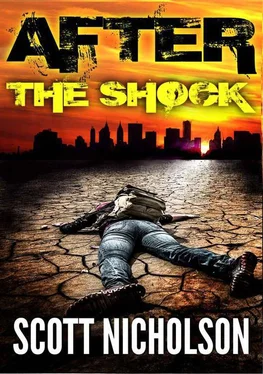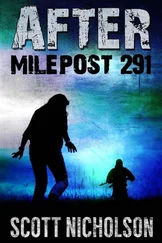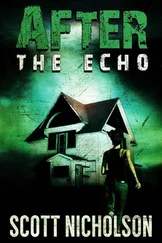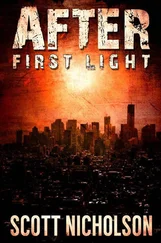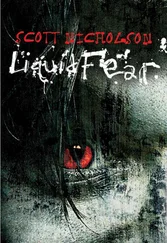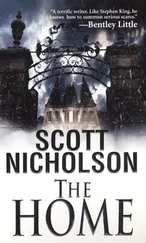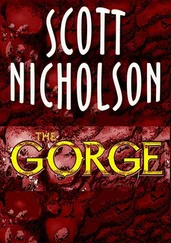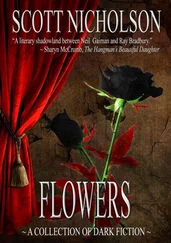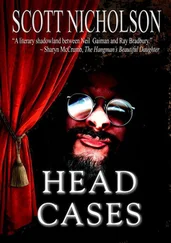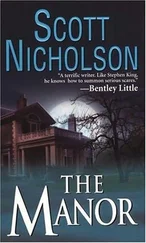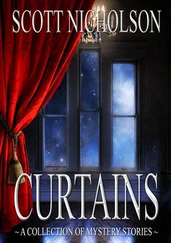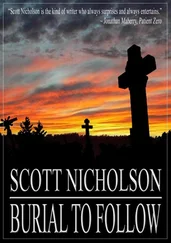Scott Nicholson - The Shock
Здесь есть возможность читать онлайн «Scott Nicholson - The Shock» весь текст электронной книги совершенно бесплатно (целиком полную версию без сокращений). В некоторых случаях можно слушать аудио, скачать через торрент в формате fb2 и присутствует краткое содержание. Год выпуска: 2012, Издательство: Haunted Computer Books, Жанр: sf_postapocalyptic, Ужасы и Мистика, на английском языке. Описание произведения, (предисловие) а так же отзывы посетителей доступны на портале библиотеки ЛибКат.
- Название:The Shock
- Автор:
- Издательство:Haunted Computer Books
- Жанр:
- Год:2012
- ISBN:нет данных
- Рейтинг книги:3 / 5. Голосов: 1
-
Избранное:Добавить в избранное
- Отзывы:
-
Ваша оценка:
- 60
- 1
- 2
- 3
- 4
- 5
The Shock: краткое содержание, описание и аннотация
Предлагаем к чтению аннотацию, описание, краткое содержание или предисловие (зависит от того, что написал сам автор книги «The Shock»). Если вы не нашли необходимую информацию о книге — напишите в комментариях, мы постараемся отыскать её.
The Shock — читать онлайн бесплатно полную книгу (весь текст) целиком
Ниже представлен текст книги, разбитый по страницам. Система сохранения места последней прочитанной страницы, позволяет с удобством читать онлайн бесплатно книгу «The Shock», без необходимости каждый раз заново искать на чём Вы остановились. Поставьте закладку, и сможете в любой момент перейти на страницу, на которой закончили чтение.
Интервал:
Закладка:
“Uh… some people out there are coming to kill us.” He wasn’t sure if “people” was the right word, but he didn’t have time for a brief history of the end of the world. He cast about for a weapon of any kind.
“The Book of Peter,” the man said. “Do you know Peter?”
“Yeah. He’s holed up a couple blocks away. Come with me. We have a better chance with the two of us.”
The man waved to the empty rows behind him. “I can’t leave my flock.”
“You the preacher?” Campbell thought he heard something scraping against the church door.
“I am a servant.”
Campbell’s frustration mounted. He didn’t have time to deal with a madman. But he still clung to old notions of camaraderie and civility, even if it meant those values were baggage. “Well, you better serve yourself right now. Or you’re going to be dead.”
“And the dead in Christ will rise first.”
Campbell gave up. There was banging at the main door, the noise made even more disturbing by its steady rhythm and insistence.
Almost like they’re not enraged, just stopping by for a visit to check on the neighbors.
The altar was about a foot higher than the nave floor, and was flanked by two tall brass candlesticks that matched the cross. United States and North Carolina flags stood on thick wooden poles on either side of the cross in an incongruous mash-up of church and state that was particular to Southern Baptist churches. A darkened set of stairs led down on one side of the altar. Despite the high windows, the light was so weak that Campbell didn’t think he’d fare better by wandering deeper into the bowels of the church.
Campbell jumped onto the platform and grabbed the state flag, attracted by the sharp wooden point on top of the pole. It was about seven feet tall, and as he removed it from its heavy base, he realized that it would be far too cumbersome to ward off an attacker. He gripped one of the tall brass candle holders, knocking the stubby candle from it as he gave it a test swing. It was about three feet in length and had a satisfying heft.
“That’s property of the Lord,” the preacher said, rising from the pew and dropping his hymnal.
“I’ll give it back when I’m done.” Campbell made one last attempt to get the preacher to come with him, holding the candlestick aloft. “Side door, make a run for it—I got your back.”
The preacher turned toward the main entrance, where the pounding of many hands continued. “All are welcome in the house of God.”
The preacher clasped his hands and bowed in reverence as he started his slow trek up the aisle. He murmured some sort of poetic prayer, but Campbell didn’t wait around to see how the message played to his newfound congregation. Instead, he descended the stairs into darkness.
On the lower floor, a few small utility windows illuminated a narrow hall that broke off into several meeting rooms. Campbell hoped he hadn’t backed himself into a corner. He felt confident that he could fight his way past one or two Zapheads, but he didn’t have any delusions about playing gladiator against a crowd of them.
He tried a door to his left. It opened onto a dim room that had probably been used for Sunday School classes. The stench hit him like a sheet of ice. Bodies were stacked in various positions on the floor, arranged in the shape of a cross. As Campbell backed out of the room with his nose buried in the crook of his elbow, he wondered if the preacher had laid out some sort of demented holy tribute in a burst of apocalyptic fever.
Out in the hall, he heard the preacher’s voice soaring into a rhapsodic welcome.
Why haven’t the Zappers killed him yet?
Turning a bend, he spotted a fire exit. As he kicked the release bar, gripping the heavy candlestick, sunlight poured around him, and he was cravenly grateful that the preacher had offered himself as a decoy.
CHAPTER TWENTY-EIGHT
They kept to the shadowed side of the street, moving fast. Rachel led the way, hoping she was headed north. DeVontay seemed to be even less of a Boy Scout than she was, so he didn’t question her judgment. Or maybe he was keeping his eyes in the side alleys, worried less about the destination than the journey.
They’d gone at least ten blocks without seeing any signs of life—if such a word was even appropriate under the circumstances. Birds flapped in the eaves of the buildings and the canopy of trees, and Rachel heard a hound dog baying in the distance once, but mostly, the town was just a still life of abandoned cars and silent storefronts. The stench of death emanated from inside many of the buildings, so they didn’t bother with a door-to-door search for survivors. Calling out for them was risky as well, since the noise might attract Zapheads.
The streets were remarkably free of corpses, given the density of the population, but once they came upon a shrunken man with a stringy white beard, leaning against a brick wall with his arms tucked under his knees. In the old days, he might have passed for a homeless man, rags tied around his ankles.
“Hey, Pops?” DeVontay whispered, afraid to touch him.
The man didn’t move so they kept going. Stephen’s expression didn’t change, which saddened Rachel. A boy shouldn’t be hardened to the point of numbness. His days should be filled with bubble gum, comic books and video games instead of death.
The street signs were just as ordinary as ever, a mute testament to places gone by: Hayward Street, Depot Street, Old Bristol Turnpike. They passed a bridal shop, the front window filled with headless and armless mannequins, impossibly anorexic, displaying flowing white dresses. Rachel’s breath caught at the sight. She’d never be a bride now, not like that.
“Yuck,” Stephen said, bored by the window shopping. He walked to the edge of the street and bent to play with the trash that had collected in the rain gutter.
DeVontay pressed close behind her. “That man back there…you notice something funny?”
“Just another somebody that didn’t make it,” she said.
“He’s fresh. Not dark and bloated.”
Rachel glanced at Stephen, appreciating the relatively healthy glow of his skin compared to the putrefaction all around them. “Just because you survive the solar flares doesn’t mean you don’t have to die someday.”
“But he wasn’t beat up, from what I could see. Just curled up like he was waiting for it.”
Rachel again thought of the pills the pharmacist had given her. Not everyone had a spiritual or moral aversion to suicide. For some, suicide might look like an elevator to the Pearly Gates.
“There are lots of ways to die,” she said. “He was old. Maybe he had a heart attack. Or couldn’t get his medicine.”
“Don’t nobody die from natural causes anymore.”
“Okay, then. Maybe he had a bullet hole in his back. Shot by the military.”
“No puddle of blood around him.”
Annoyed, Rachel checked the reflection in the storefront glass and saw Stephen walking into the street. She called to him, but he kept going, dragging Miss Molly by the hair as if he’d forgotten he was carrying a doll. DeVontay took off running after him, and Rachel broke free of her paralysis and followed.
When they caught up with Stephen, they were able to see the town square, a fifty-foot courthouse with a cracked concrete façade and a dome top surrounded by oak trees whose leaves were darkening with autumn. The courthouse lawn was a wide public commons crisscrossed with walkways, punctuated with a bronze statue of some Revolutionary War hero gone green with patina and pigeon poop. The idyllic small-town postcard was marred by wrought-iron benches that bore a tableau of corpses. More corpses were slumped on the courthouse steps, which was as crowded as if district court was holding a brief recess to allow a smoke break for the accused.
Читать дальшеИнтервал:
Закладка:
Похожие книги на «The Shock»
Представляем Вашему вниманию похожие книги на «The Shock» списком для выбора. Мы отобрали схожую по названию и смыслу литературу в надежде предоставить читателям больше вариантов отыскать новые, интересные, ещё непрочитанные произведения.
Обсуждение, отзывы о книге «The Shock» и просто собственные мнения читателей. Оставьте ваши комментарии, напишите, что Вы думаете о произведении, его смысле или главных героях. Укажите что конкретно понравилось, а что нет, и почему Вы так считаете.
